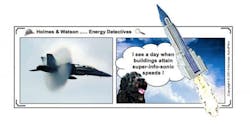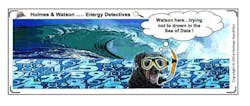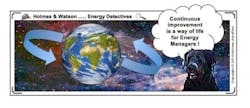The Question is Not If Big Data & Analytics Will Revolutionize the Energy Efficiency Profession, But When
Watson: I have frequently criticized your profession Holmes for refusing to keep pace with the times; for continuing to use antiquated methods that haven’t changed in 40 years such as Energy Audits and Benchmarking based on spot data from data loggers, methods that benefit the practitioners more than the facility owners.
As a young pup fresh out of engineering school I am continually amazed and disappointed that in 2014, the Information Age, the Energy Efficiency Profession is still mired in the Estimation Age.
But I have been doing some research and it appears to me that things are finally starting to change. Interestingly enough, the changes are not coming from within the Profession but from outsiders that recognize the value of Information and how to use it effectively.
Holmes: I think you’re right Watson; I have been sensing the same thing. Why don’t you share with our readers some of the things you have uncovered?
Watson: My pleasure. I have added some comics featuring “moi” to emphasize some of the key points from the following three articles:
The first is “Any Industry that Effectively Manages Energy can Reduce its Costs Significantly”. It was published just a couple of weeks ago by Paul Studebaker, the chief editor of Control Journal while he was attending the Power and Energy Management Forum at Automation Fair in Anaheim, California. During the session: Trim Your Power Bill by 10% or More, Matthew Littlefield, president and principal analyst of LNS Research discussed how companies can drive both productivity and profit with industrial energy management. He said that "the most sustainable companies are also the most successful companies…all industries could save 10-40% of their energy costs by improving efficiencies”. Read the Article
“Energy managers know the keys to success are …metrics (including energy intensity, with the ability to drill down to the machine level), … You really need continuous monitoring to develop and execute long-term strategies, to not just hop from one low-hanging fruit (lighting, motors, compressed air) to another." Littlefield said.
Companies need enterprise-level programs and reporting to measure energy use and savings and to prioritize investments in efficiency across the enterprise. But they also need granular measurements, by material, machine and product, to influence procurement and operations to work together more effectively and move energy from a fixed facility cost to a production input. Only then can you give operations the understanding they need to effect change.
His actionable recommendations included:
- Ensure both energy and production data is collected with sufficient granularity to provide the analytical capabilities for measuring energy intensity of specific products and assets
- Focus on KPI visibility and the connection between energy consumption and production performance to drive a quick ROI.
The second article is “The Top 10 Big Data Quotes of All Time” by Bernard Marr. Read the Article
His list includes:
- “Big data is at the foundation of all the megatrends that are happening today, from social to mobile to cloud to gaming.” – Chris Lynch, Vertica Systems
- “Big data is not about the data” – Gary King, Harvard University, making the point that while data is plentiful and easy to collect, the real value is in the analytics.
- “Information is the oil of the 21st century, and analytics is the combustion engine.” – Peter Sondergaard, Gartner Research
- “You can have data without information, but you cannot have information without data.” Daniel Keys Moran, computer programmer and science fiction author
- “Hiding within those mounds of data is knowledge that could change the life of a patient, or change the world.” – Atul Butte, Stanford School of Medicine
- “Errors using inadequate data are much less than those using no data at all.” Charles Babbage, inventor and mathematician
- “To call in the statistician after the experiment is done may be no more than asking him to perform a post- mortem – he may be able to say what the experiment died of.” – Ronald Fisher, biologist, geneticist and statistician
- “Without big data, you are blind and deaf in the middle of a freeway” – Geoffrey Moore, management consultant and theorist.
The third article is “A Facility Monitoring System; The Single Most Effective Tool Available to an Energy Manager”. It was written 20 years ago and published in Strategic Planning for Energy and the Environment. Read the Article
I think the author was way ahead of his time. See if you can guess who the author is. It includes the following:
“A permanent monitoring system … to identify where and how energy is used in a facility on a dynamic and real-time basis … allows energy consumption patterns and utility costs to be understood and managed in the same manner as all other costs within a facility. It allows energy decisions to be information-based …. These savings range from 15 to more than 50%, often with no capital investment by the owner.
“The first step in any financial management process is setting up a system for determining and tracking individual expenditures on a continuing basis.”
“Utility costs … represent opportunities, often significant and untapped, to improve the bottom line …. Energy usage in a facility is complex and dynamic. It must be continuously monitored, measured, evaluated and managed.”
Holmes: I remember that article Watson. I must sound like a broken record. My first article in the AEE Journal was published in 1984 and it was a case study of a project in a Mental Health Hospital where we installed a Permanent Energy Monitoring System with sophisticated analytics and used the resulting data to reduce the energy costs by 59%. The savings resulted from tuning up and improving the efficiencies of the existing energy systems and no capital projects were required.
I’ve been trying since that very first project to share our methods and the tremendous opportunity that exists in all facilities to do the same by using valid data coupled with fundamental management and scientific problem-solving methods.
Watson: To quote Bob Dylan, it sounds like finally “The Times They Are a-Changin’” Holmes!









